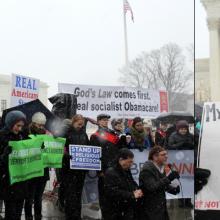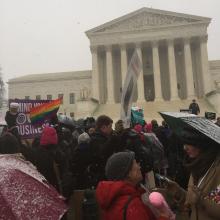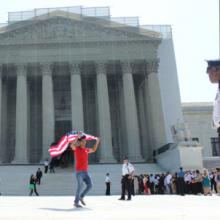contraception
Religious groups are battling the state of California over whether employee health insurance plans require them to pay for abortions and some forms of contraception that some find immoral.
So is the state forcing churches to pay for abortions? It depends on who you ask.
The issue gained traction after Michelle Rouillard, director of the California Department of Managed Health Care, sent a letter to Anthem Blue Cross and several other insurance firms in August warning providers that state law requires insurers to not deny woman abortions. “Thus, all health plans must treat maternity services and legal abortion neutrally,” she wrote.
Rouillard wrote that state law provides an exemption for religious institutions.
“Although health plans are required to cover legal abortions, no individual health care provider, religiously sponsored health carrier, or health care facility may be required by law or contract in any circumstance to participate in the provision of or payment for a specific service if they object to doing so for reason of conscience or religion,” she wrote.
“No person may be discriminated against in employment or professional privileges because of such objection.”
However, two legal groups have filed complaints with the U.S. Department of Health and Human Services, alleging the California rule puts faith-based organizations in a position to violate their conscience.
A midpoint report from this month’s Synod of Bishops reveals that Catholic leaders are considering more conciliatory language toward gays and lesbians, divorced and remarried Catholics, and couples who live together before getting married.
Meeting with nearly 200 senior prelates and several dozen lay experts and observers at the Vatican, Pope Francis has deliberately engineered a lively discussion of issues concerning marriage and family life. This assembly, and a follow-up summit in 2015, will help shape the pontiff’s legacy.
Reporters and commentators are producing a flurry of analysis mostly centered on the question of whether the synod portends a change in substance or merely a change in tone. Such is the abiding question of Francis’ papacy.
Yet through these lively debates in Catholic life runs a theme that is as old as the Reformation: the role of individual conscience.
It is an identical claim to moral superiority which matters and which is in fact the cause of the apparent conflict. The underlying issues, whatever you think they may be, whether religious freedom, women’s reproductive rights, creeping restrictions on abortion or loosening of civil rights protections—all these issues are things we can talk about and solve together through discussion and compromise. ...Unless we begin from a position that says, "We refuse to talk with you or compromise."
Five things to know about one of the most anticipated Supreme Court decisions of the year:
1. Corporations can’t pray, but they do have religious rights.
Hobby Lobby isn’t a person. It’s a chain of crafts stores owned by a religious family. And though the evangelical Green family objects to parts of the Affordable Care Act’s emergency contraception mandate, it’s not the Greens but the company that writes the check for employees’ health insurance. The first question the justices had to answer was this: Does Hobby Lobby have religious rights? To many Americans, this sounds a little nutty. Does a craft store believe in God?
A majority of the justices held that a closely held company such as Hobby Lobby does have religious rights. The court didn’t apply those rights, however, to publicly held corporations, where owners’ religious beliefs would be hard to discern.
But well before the justices had delivered their verdict on this question, many legal scholars said they wouldn’t be surprised were they to affirm the company’s religious rights. American corporations do have some of the rights and responsibilities we usually associate with people. And in the 2010Citizens United campaign finance case, the justices overturned bans on corporate political spending as a violation of freedom of speech — corporations’ free speech.
The Supreme Court on Monday sided with the evangelical owners of Hobby Lobby Stores Inc., ruling 5-4 that the arts-and-crafts chain does not have to offer insurance for types of birth control that conflict with company owners’ religious beliefs.
Beyond the specifics of the Hobby Lobby case before them, the justices broke new legal ground by affirming that corporations, not just individual Americans or religious non-profits, may claim religious rights.
Does Monday’s decision mean, however, that the religious beliefs of business owners stand paramount? That they are more important than a female employee’s right to choose from the full array of birth control methods she is promised under the Affordable Care Act? Or that a business owner may invoke his religious rights to deny service to a gay couple?
Not necessarily, legal experts say.
The U.S. Supreme Court is expected to finally issue its ruling this week in the highly anticipated case of the craft companies vs. Obamacare.
Technically, it’s Sebelius v. Hobby Lobby and Conestoga Wood Specialties, a showdown over the Affordable Care Act’s contraception coverage mandate. The core legal question is whether a private company can have religious rights.
But to the general public, this is seen as a showdown between employers — the evangelical Green family behind Hobby Lobby and the Mennonite Hahn familythat owns the Conestoga cabinet company — and the employees’ personal reproductive choices under their insurance.
While conservatives have cast the battle as one for religious freedom, the general public may see it as a showdown over personal health choices.
Today, the Supreme Court heard two cases that have major implications for the intersection of religious liberty and health care in America. While Sebelius v. Hobby Lobby Stores and Conestoga Wood Specialties Corp. v. Sebelius were argued before the Court, hundreds of activists voiced their opinions outside the Court’s chambers.
The Court will decide whom the so-called “contraception mandate” law in the Affordable Care Act applies to. Both of the challengers to this section of the 2010 health law say that providing certain forms of birth control violates their sincerely held religious views. Though there are already exemptions in law for churches and some nonprofits, this case will decide whether for-profit corporations are offered protection under the religious liberty clause of the First Amendment to deny contraception coverage to their employees.
As we near the March 25 arguments in Hobby Lobby v. Sebelius, it can feel as though men have the monopoly on religious activism in America. After all, 38 protestant theologians signed on to an amicus brief suggesting that a business owner’s religious beliefs should dictate the consciences and actions of female employees – none of those theologians were women.
A glance at the past, present, and future of women’s leadership in American religious life, however, shows this simply is not true. Today, as throughout American history, women have fought for their voice in religion, the opportunity to express their faith, and to obtain the same access to religious leadership as their brothers. Just as in other areas of work and life, creating opportunities for women to increase their hand in religious leadership is vital to greater equality and new perspectives in theology, moral activism, and spirituality.
Despite the increase in women in clergy careers over the last 40 years, it has been an uphill battle for women who have changed hearts, minds, and traditions for career opportunities as clergy and religious leaders in churches, synagogues, and mosques. Issues around the “ stained glass ceiling” in clergy careers can range from discouraging congregants who are biased against women clergy to institutional inequalities: men still outnumber women in clergy positions in America, and, according to the Bureau of Labor Statistics, only 20.5 percent of self-described clergy were women in 2012. In certain religious traditions — the Roman Catholic Church, the Church of Jesus Christ of Latter Day Saints, the Orthodox Church, and Orthodox Judaism, for example — women cannot be ordained as clergy or prayer leaders. It is also very rare to find Muslim women leading mixed-gender services.
Once Steve Green sets his path, there’s no turning back.
Not when he saw no point in college, going directly into his family’s Hobby Lobby craft store business. Green, now 50, rose up from assembling picture frames for “bubble gum money” at age 7 through every job, including cleaning toilets, to president of the $3.3 billion national chain, one of the nation’s largest private companies.
And certainly not now when, he says, the U.S. government is challenging his unshakeable Christian faith and his religious liberty.
Arizona Gov. Jan Brewer may have ended the latest controversy in her state by vetoing a “religious freedom” bill that threatened gay men and lesbians, but the nation’s legislatures and courts are just getting started.
While religious liberty remains a “core value” in Arizona, Brewer said Wednesday, “so is non-discrimination.” And therein lies the balancing act that’s at the root of several other disputes.
The answer isn’t simple. Congress and the states often carve out exceptions for religious beliefs. The Supreme Court has consistently made room for religious exercise. And unlike race and gender, sexual orientation is not a protected class — yet.
High-level debates over Catholic teachings on marriage and divorce and other hot-button issues heated up on Wednesday as a highly anticipated effort to overhaul the Vatican bureaucracy slogged through the devilish details of financial reform.
The multitrack talks launched months ago by Pope Francis ramped up this week as some 185 cardinals converged on Rome to watch the pontiff add 19 new members to their select ranks this weekend, part of what some called “the most critical week” of Francis’ year-old papacy.
Anticipation is mounting for a series of closed-door discussions on Thursday and Friday, when the cardinals will hold what are expected to be frank talks about issues such as contraception, cohabitation, gay marriage, and whether divorced and remarried Catholics can receive Communion.
Conception. Pregnancy. Abortion. Abortifacient.
Those words today are in a rhetorical swamp where contesting religious, medical, and political views muddy understanding. And soon the U.S. Supreme Court will wade in.
On March 25, it will hear challenges to the Affordable Care Act’s provision that employers must provide insurance coverage with no co-pays for contraception.
As the U.S. Catholic bishops began their annual fall meeting on Monday, they were directly challenged by Pope Francis’ personal representative to be pastors and not ideologues — the first step of what could be a laborious process of reshaping the hierarchy to meet the pope’s dramatic shift in priorities.
“The Holy Father wants bishops in tune with their people,” Archbishop Carlo Maria Vigano, the Vatican ambassador to the U.S., told the more than 250 American churchmen as he recounted a personal meeting in June with Francis.
The pontiff, he added, “made a special point of saying that he wants ‘pastoral’ bishops, not bishops who profess or follow a particular ideology,” Vigano said. That message was seen as an implicit rebuke to the conservative-tinged activism of the bishops’ conference in recent years.
Almost since his election in March, Francis has signaled that he wants the church to strike a “new balance” by focusing on the poor and on social justice concerns and not overemphasizing opposition to hot-button topics like abortion and contraception and gay marriage — the signature issues of the U.S. bishops lately.
Federal officials have asked the U.S. Supreme Court to review the government mandate that private companies offer employees birth control coverage despite the business owner’s moral objections, with the company at the center of the suit owned by billionaire evangelical Christians.
Hobby Lobby’s lawsuit has been one of the most high profile of 60-some cases involving the Obama administration’s contraceptive mandate. The arts and crafts chain was founded by David Green, whom Forbes called “the biblical billionaire backing the evangelical movement.”
In June, the Obama administration issued final rules for the mandate that requires most employers to provide contraception at no cost. While there are exemptions for religious groups and affiliated institutions, there are no carve-outs for private businesses with religious owners.
The Obama administration on Friday issued final rules for religious groups for its controversial contraception mandate, maintaining its position on who qualifies for religious exemption and allowing no carve-outs for private business owners.
More than 60 lawsuits have been filed over the mandate, a part of President Obama’s Affordable Care Act that requires most employers to provide contraception at no cost to employees.
Just as when the draft rules were first unveiled in February, conservatives denounced them as an unconstitutional violation of religious freedom that forces religious organizations and the religious owners of private businesses to offer services they find morally abhorrent.
COLUMBUS, Ohio — Thirteen state attorneys general are urging the federal government to broaden religious exemptions for private businesses under the White House’s contraception mandate, claiming the policy violates religious freedoms.
Put simply, the group believes any employer who says he or she objects to contraception should not have to provide contraceptive coverage.
Five key Catholic bishops are opposing the newly authorized Violence Against Women Act for fear it will subvert traditional views of marriage and gender, and compromise the religious freedom of groups that aid victims of human trafficking.
The act, which was signed into law by President Obama on Thursday, is intended to protect women from domestic violence, sexual assault and human trafficking, and allows the federal government to spend money to treat victims and prosecute offenders.
That language disturbs several bishops who head key committees within the U.S. Conference of Catholic Bishops that deal with, among other issues, marriage, the laity, youth and religious liberty.But for the first time since the original act became law in 1994, it spells out that no person may be excluded from the law’s protections because of “sexual orientation” or “gender identity” — specifically covering lesbian, transgender and bisexual women.
The nation’s Catholic bishops on Thursday rejected the Obama administration’s latest proposals to broaden accommodations for religious groups in regulations that require insurance companies or employers to provide free birth control coverage.
The administration last week released a long-awaited compromise for faith-based employers that have religious objections to offering health insurance that could be used by employees to access contraceptives and sterilization.
Yielding to demands by the bishops and other critics, the new accommodation contained a more expansive definition of what constitutes a religious group.
It also detailed how faith-based institutions that may not be exempt – especially religiously affiliated hospitals and universities – would be shielded from any involvement in providing contraceptive coverage; under the new rules, the insurance companies themselves would arrange that with the individual employee.
But New York Cardinal Timothy Dolan, president of the U.S. Conference of Catholic Bishops, said the proposals fail to address or ease all of the hierarchy’s concerns, and said the bishops would continue to press ahead with efforts to overturn the mandate in court.
The Obama administration on Friday sought to placate religious groups by broadening religious exemptions and giving faith-based organizations more room to maneuver around its controversial contraception mandate, but the new rules offer no loopholes for privately owned businesses.
The contraception mandate, part of Obama’s health care overhaul, had set off an explosive church-state dispute and soured relations between the White House and some Christian groups, including the Catholic bishops’ conference.
The new rules, issued by the Health and Human Services Department, seek to address religious freedom concerns in two ways: First, they broaden the definition of “religious employers” so that all houses of worship and dioceses and affiliated organizations will be clearly exempt. Second, for other faith-based employers, the rules would transfer the costs and administrative tasks of the birth control insurance policies to insurance companies.
WASHINGTON — Foes of the federal contraception mandate are cheering a Tuesday appeals court decision requiring the Obama administration to devise exemptions to the new rule for two Christian colleges.
They’re also buoyed by the D.C. Circuit Court’s reversal of lower court decisions to throw out their cases. The administration had argued that because it was crafting an exemption to the contraception rule, the cases should not go forward.
Now the cases continue, and every 60 days, the administration must report on its plan to ensure that the colleges do not have to comply with the new rule, which mandates that employers cover contraception in their health plans.
“This is a win not just for Belmont Abbey and Wheaton, but for all religious non-profits challenging the mandate,” said Kyle Duncan, general counsel of the Becket Fund for Religious Liberty, who argued the case.

















